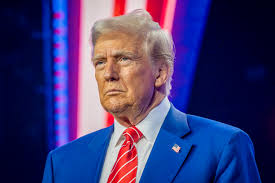…China threatens countermeasures as tariffs escalate trade tensions
By Yahaya Umar
U.S. President, Donald Trump, is set to enact sweeping new tariffs in a move that could escalate trade tensions globally.
Details of the tariffs remain uncertain as the Trump administration finalises specifics ahead of a scheduled 4:pm Eastern Time ,9:pm GMT+1, announcement in the White House Rose Garden, reports CNN.
The tariffs are expected to take immediate effect following Trump’s declaration, with a separate 25% tariff on auto imports slated to begin on April 3.
The measures are expected to prompt retaliatory responses from key trading partners.
Trump declared in a post on his Truth Social platform on Wednesday that “it’s liberation day in America!” but provided no further details.
Trump, a long-time advocate for tariffs, has described them as “the most beautiful word in the dictionary”, arguing that the new levies are designed to level the playing field against what he described as unfair trade barriers imposed by other nations.
Reacting to the tariffs, European Central Bank President Christine Lagarde warned in an interview with Ireland’s Newstalk radio that the measures would have widespread negative consequences.
“It will be detrimental worldwide, with varying intensity and duration depending on the scope, targeted products, and potential negotiations”, she stated
Business leaders across multiple industries, from automobiles to luxury goods, await clarity as Trump exercises emergency powers to swiftly impose, remove, and reinstate tariffs.
Peter Sand, chief analyst at freight pricing platform Xeneta, told CNN that, “It’s nearly impossible to make strategic supply chain decisions when the rules keep shifting”.
Italian Prime Minister, Giorgia Meloni, who has maintained a diplomatic approach toward Trump, warned that the tariffs could severely impact Italian businesses and prove “unfair” for American consumers. “A trade war benefits neither the United States nor Europe”, she stated.
Since returning to office on January 20, Trump has implemented a 20% tariff on all Chinese imports due to concerns over fentanyl production and reinstated 25% duties on steel and aluminum, extending these tariffs to nearly $150bn in downstream products.
A temporary halt for most Canadian and Mexican goods from the 25% fentanyl-related tariffs was implemented, however, it is set to expire on Wednesday.
Key trading partners, including the European Union, Canada, and Mexico, have vowed to retaliate with countermeasures, while some nations attempt to negotiate exemptions.
Australian leaders, including Prime Minister Anthony Albanese and opposition leader Peter Dutton, have pledged to defend their country’s beef exports against potential U.S. tariffs.
Meanwhile, Canadian Prime Minister Mark Carney and Mexican President Claudia Sheinbaum have discussed strategies to counteract what they consider “unjustified trade actions” from the U.S., according to Carney’s office.
Trump argues that American workers and manufacturers have suffered under past free-trade agreements that facilitated a $3tr market for imports and contributed to a $1.2tr goods trade deficit.
However, economic analysts warn that a broad 20% tariff could cost the average U.S. household at least $3,400 annually, according to the Yale University Budget Lab.
Meanwhile, China has intensified measures following U.S. President Donald Trump’s announcement of new tariffs on Chinese goods.
On Thursday, Beijing issued a strong response, threatening countermeasures to safeguard its interests and accusing the U.S. of violating international trade rules.
Trump’s latest tariff hike, announced on Wednesday, imposes an additional 34% levy on Chinese imports, raising total duties on many products to over 50%.
This follows earlier measures, including 20% tariffs and two tranches of 10% additional duties imposed since Trump’s return to power in January. The White House justified these actions as necessary to combat the flow of illicit fentanyl from China to the U.S.
China’s Ministry of Commerce condemned the tariffs, describing them as unilateral and subjective assessments that undermine international trade norms.
In a statement issued Thursday morning, the ministry declared, “China firmly opposes this and will resolutely take countermeasures to safeguard its own rights and interests”. It further urged Washington to resolve disputes through dialogue, warning of retaliatory actions if the measures are not withdrawn.
The ministry added, “The United States has drawn the so-called ‘reciprocal tariffs’ based on subjective and unilateral assessments, which are inconsistent with international trade rules and seriously damage the legitimate rights and interests of relevant parties”.
The tariffs, which include a 10% baseline tax on all imports, a 25% levy on foreign-made cars, and reciprocal duties calculated at 50% of other nations’ rates on U.S. exports, are among the most extensive in American history.
Analysts warn that these measures could fundamentally reshape trade relations between the world’s two largest economies, impacting roughly $500 billion in bilateral trade.
Businesses with supply chains rooted in China face significant challenges as they scramble to adapt to the unexpectedly high levies. Some Chinese and multinational companies have already shifted production to other parts of Asia to skirt existing tariffs.
However, Trump’s additional 10% duties on all imports and country-specific measures targeting Asian nations have rattled markets globally.
In response to the escalating trade war, China, Japan, and South Korea—three of Asia’s leading economic powerhouses—have pledged to strengthen regional trade cooperation.
During their first economic dialogue in five years, held on Sunday, the trade ministers of the three nations agreed to pursue comprehensive negotiations for a trilateral free trade agreement ,FTA.
This initiative aims to promote both regional and global trade, providing a united front against the economic disruptions caused by Trump’s tariffs.





